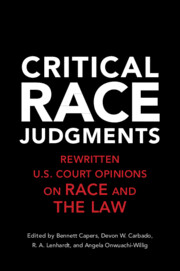Book contents
- Critical Race Judgments
- Critical Race Judgments
- Copyright page
- Contents
- About the Contributors
- Advisory Committee
- Foreword
- Introduction
- 347 U.S. 483 (1954)BROWN et al.
- Part I Membership and Inclusion
- Part II Participation and Access
- Part III Property and Space
- 60 U.S. 393Supreme Court of the United States
- 538 U.S. 343Supreme Court of the United States
- 403 U.S. 217Supreme Court of the United States
- 401 U.S. 424 (1971)Supreme Court of the United States
- 426 U.S. 229Supreme Court of the United States
- 389 U.S. 347Supreme Court of the United States
- 528 U.S. 119Supreme Court of the United States
- Part IV Intimate Choice and Autonomy
- Part V Justice
60 U.S. 393Supreme Court of the United States
DRED SCOTTv.John F.A. SANFORDHarriet Robinson Scott, on behalf of herselfand Eliza and Lizzie Scottv.John F.A. SANFORD.Nos. 35–36
from Part III - Property and Space
Published online by Cambridge University Press: 22 April 2022
- Critical Race Judgments
- Critical Race Judgments
- Copyright page
- Contents
- About the Contributors
- Advisory Committee
- Foreword
- Introduction
- 347 U.S. 483 (1954)BROWN et al.
- Part I Membership and Inclusion
- Part II Participation and Access
- Part III Property and Space
- 60 U.S. 393Supreme Court of the United States
- 538 U.S. 343Supreme Court of the United States
- 403 U.S. 217Supreme Court of the United States
- 401 U.S. 424 (1971)Supreme Court of the United States
- 426 U.S. 229Supreme Court of the United States
- 389 U.S. 347Supreme Court of the United States
- 528 U.S. 119Supreme Court of the United States
- Part IV Intimate Choice and Autonomy
- Part V Justice
Summary
Decided March 6, 1857.
Justice Cheryl I. HARRIS delivered the opinion of the Court.1
Dred and Harriet Scott have petitioned the courts for their freedom and the freedom of their two children, Eliza and Lizzie, for more than ten years. The relief they are seeking is of crucial significance to them as a family, but the issues implicated in their case go to the heart of the national identity and will shape the nation’s destiny. The conflict over slavery that is now raging in the political sphere is not new although, in recent times, it had taken on a more incendiary tone. Its origins lie in the contradiction between the ideals of liberty guaranteed by the Declaration of Independence to the Constitution and the institution of slavery.The birth of the nation was bound up with slavery as well as the dispossession of native tribes, upon whose land the great edifice of American finance, wealth, and power have been built.
Keywords
- Type
- Chapter
- Information
- Critical Race JudgmentsRewritten U.S. Court Opinions on Race and the Law, pp. 305 - 323Publisher: Cambridge University PressPrint publication year: 2022



